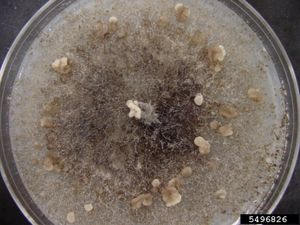Botrytis porri
From Pestinfo-Wiki
| Literature database |
|---|
| 7 articles sorted by: |
| • year (recent ones first) |
| • research topics |
| • countries/regions |
| • host plants |
| • list of antagonists |

culture of Botrytis porri with sclerotia (click on image to enlarge it)
Author(s): Lindsey du Toit, Washington State University
Source: IPM Images
Author(s): Lindsey du Toit, Washington State University
Source: IPM Images
Botrytis porri N.F. Buchw. 1949
This fungus is widely distributed and causes neck and clove/bulb rot on garlic. Outbreaks of leaf blight have been also reported on garlic (Zang et al., 2009). Further, other Allium crops may become infected like leek, onions and shallot. Similar diseases are caused by Botrytis allii and B. aclada.
The fungus spreads through airborne conidia. It may also be seedborne (du Toit et al., 2002). Sclerotia are formed in the soil and persist until the next season. The conidia are one-celled and approximately 12-16 x 8-12 µm in size. The sclerotia are black and about 2-8 mm large.
Synonyms:
Botryotinia porri